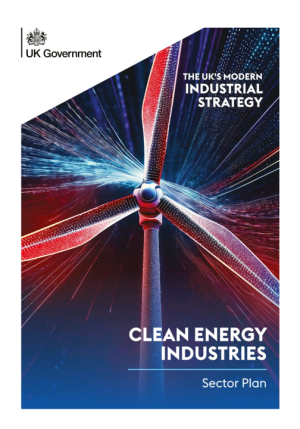Published: 25th June 2025

The recent Spending Review brought promising news for UK-based engineering contractors. Further details have now emerged with the publication of the UK government's The UK's Modern Industrial Strategy. The strategy is underpinned by a series of 'Sector Plans', including a detailed proposal for the decarbonisation of the nation's energy systems. The Clean Energy Industries Sector Plan emphasises the economic opportunity of transitioning to clean energy, targeting investments in hydrogen, carbon capture, nuclear, wind and other technologies. The 'Clean Energy Industries Sector Plan' outlines milestones through 2035 for energy infrastructure projects.
BCECA CEO Tracey Shelley welcomed the additional clarity on energy transformation pathways and the commitment to UK supply chains:
"It is encouraging to see some important details being fleshed out. Engineering contractors welcome the additional clarity around energy transformation deployment pathways. The commitment to supporting UK supply chains is particularly welcomed. Now we must wait and see if this serves as a signal to investors to build robust domestic supply chains for our clean power system.
The government anticipates that targeted financial support for carbon capture, low-carbon hydrogen, gigafactories, ports, and green steel during this Parliament could catalyse around £40 billion of largely private investment per year to 2030. In these uncertain times, nothing is guaranteed, but the vision is clearer, and the prospects for spades in the ground look better.
I was also pleased to see that the report acknowledges the skills challenges that could stymie the government's ambitions. There are workforce gaps across a range of skill levels and occupations, and these will increase without further intervention. Many of the skills needed to deliver the UK energy transformation are in high demand across other sectors.
The report signals over £100m to increase the pipeline of skills through further and higher education, as well as apprenticeships. This includes a commitment to supporting the development of a 'Hydrogen & CCUS Skills Curriculum' with a network of provider expertise to support workforce development and drive growth in the sector.
However, we must recognise that these things take time. It is essential that the upskilling of the domestic workforce is complemented by a flexible approach to immigration that allows UK-based employers to bring in expert foreign labour when needed.
Additionally, the government must ensure that the learning outcomes from university degree programmes are compatible with the skills and knowledge base required by the contracting companies that will make the energy transformation a reality.
I look forward to seeing how this will work when the government unveils the 'Clean Energy Workforce Strategy' in the coming weeks.
By the time we gather for Delivering UK Energy Transformation – BCECA's virtual annual conference on 8 October 2025, the picture should be clearer, and there will be plenty to discuss."

